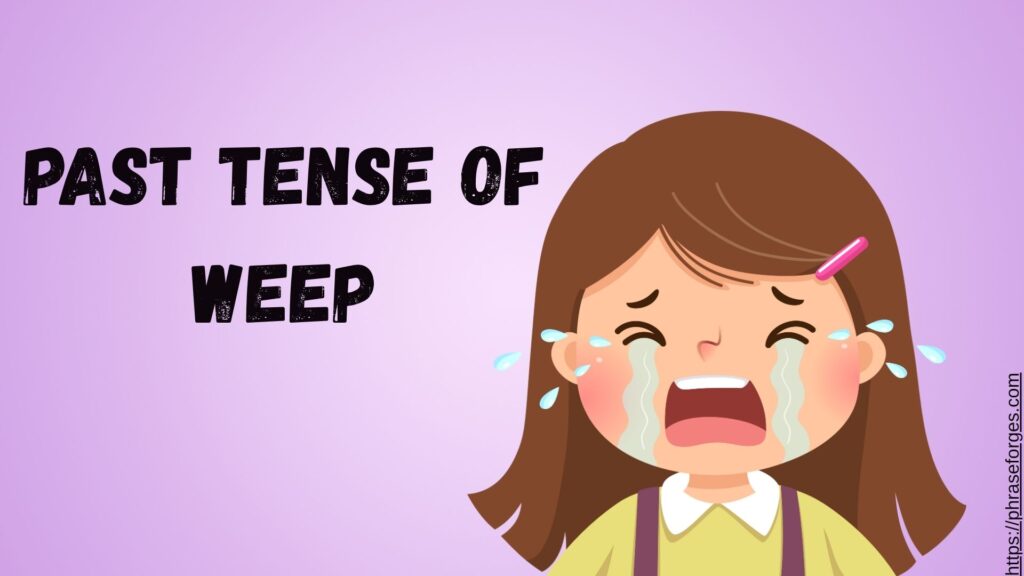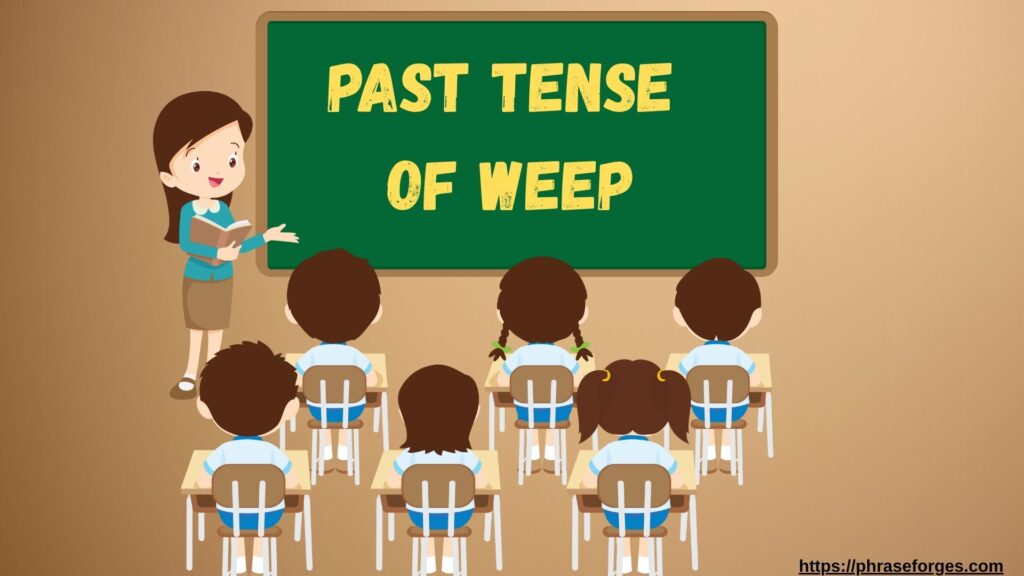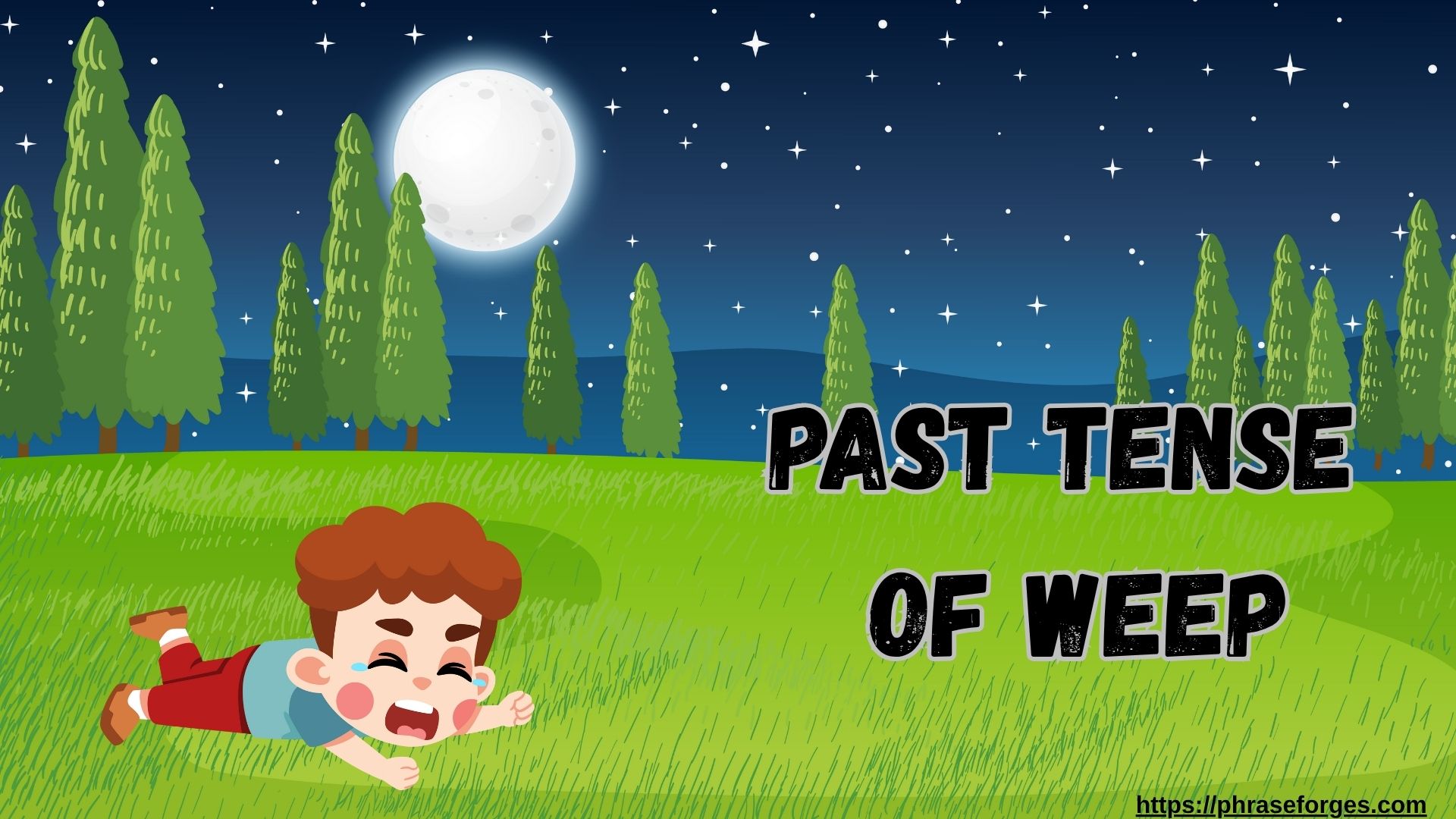Ever found yourself hesitating mid-sentence, wondering if you should say “weeped” or “wept”? You’re not the only one. It’s a common point of confusion, especially since weep is less commonly used in daily conversation compared to words like cry. Still, it’s an emotionally powerful verb, and using it correctly makes a big difference especially in writing that aims to stir feelings or convey sorrow.
Let’s explore the proper usage, common mistakes, and real-life scenarios that show how to use weep, wept, and yes why weeped is wrong.
Keyword + Intro Explanation

So, what’s the past tense of weep?
👉 The correct answer is wept.
The verb weep is irregular, which means it doesn’t follow the standard -ed rule like talk → talked or jump → jumped. Instead, it follows the same path as verbs like keep → kept, sleep → slept, and creep → crept. This pattern helps make sense of weep → wept.
Let’s dig into it.
Simple Definition + Usage Overview
🔹 What does “weep” mean?
To weep means to shed tears, to cry, or to express deep emotion through tears. It’s often used in more literary, emotional, or formal contexts than the more common verb cry.
| Verb Form | Example Sentence |
|---|---|
| Base (Infinitive) | I weep every time I hear that song. |
| Third Person Present | She weeps alone in the church pew. |
| Present Participle | He is weeping over the old love letters. |
| Past Tense | They wept when they saw the ruins. |
| Past Participle | She had wept all night before the funeral. |
And the wrong form?
❌ Weeped is a grammar mistake and should be avoided in all contexts.
Clear Rules & Patterns
✅ Why is “wept” correct?
Because weep is an irregular verb. English irregular verbs don’t follow predictable rules. Instead, they have to be memorized or recognized by their patterns.
Take a look at these irregular verb transformations:
| Base Form | Past Tense | Past Participle |
|---|---|---|
| keep | kept | kept |
| sleep | slept | slept |
| sweep | swept | swept |
| weep | wept | wept |
So remember:
If the verb ends in -eep, there’s a good chance the past form will change to -ept.
Bulleted Rules with Do’s and Don’ts

✅ Do:
- Use wept when writing in the past tense.
- Use weeping for ongoing actions (present participle).
- Choose weep when you want a more poetic or emotional tone.
❌ Don’t:
- Use weeped it’s incorrect and nonstandard.
- Confuse weep with weepy, which is an adjective.
- Overuse weep in casual speech cry is often more natural there.
Multiple Example Sentences
Using “wept” in Past Tense:
- She wept silently during the memorial.
- I wept when I read the final chapter.
- They wept for joy at the wedding.
Using “weep” in Present Tense:
- I sometimes weep during old movies.
- He weeps every year on that date.
Using “weeping” in Progressive Tenses:
- She is weeping uncontrollably after the loss.
- I found him weeping under the oak tree.
Scenario Example 1 – An Email
Subject: Thank You for Understanding
Hi Marcus,
I wanted to reach out and thank you again for your patience during yesterday’s meeting.
I know I lost composure at one point I wept after stepping out of the call. It wasn’t the topic, really it was the accumulation of a very emotional week.
I appreciate your kindness.
Warm regards,
Olivia
Here, wept carries emotional weight and reflects past action with honesty and vulnerability.
Scenario Example 2 – Fictional Blog Entry
The day my daughter graduated college, I couldn’t hold it in.
I wept not because she was leaving home, but because I remembered the first time I held her, wrapped in a tiny pink blanket.
All those years seemed to blend into that one proud moment, and I felt my heart expand.
In this context, wept isn’t about sorrow it’s about overwhelming joy. That’s the nuance weep offers over “cry.”
Before/After Examples in Everyday and Formal Contexts
| Context | ❌ Incorrect | ✅ Correct |
|---|---|---|
| Casual Talk | I weeped during the finale. | I wept during the finale. |
| She weeped when she heard. | She wept when she heard. | |
| Formal Essay | The nation weeped in mourning. | The nation wept in mourning. |
Common Mistakes & Fixes
❌ Mistake: Using “weeped”
This is a common grammatical error often made by non-native speakers and younger learners. It applies a regular verb rule (-ed) to an irregular verb.
✅ Fix:
Replace “weeped” with wept.
Quick Reference Table: Weep Verb Forms
| Tense | Correct Form | Wrong Form |
|---|---|---|
| Simple Past | wept | weeped ❌ |
| Past Participle | wept | weeped ❌ |
| Present Tense | weep / weeps | — |
| Present Participle | weeping | — |
| Auxiliary Use | has/had wept | — |
Related Irregular Verbs That Follow a Similar Pattern
| Base Verb | Past Tense | Past Participle |
|---|---|---|
| sleep | slept | slept |
| creep | crept | crept |
| sweep | swept | swept |
| leap | leapt / leaped | leapt / leaped |
| keep | kept | kept |
| weep | wept | wept |
Why Does This Matter?

Using the correct form wept shows a command of irregular verb conjugation, and that signals fluency. Whether you’re writing a novel, an academic paper, or a touching note to a friend, the form you choose affects the tone and clarity of your message.
LSI Keywords That Help Readers Find This Topic
To improve search visibility and reach more learners, include these variations throughout your content:
- weeped or wept
- weep past tense
- past participle of weep
- weep in a sentence
- weeped grammar mistake
- weep verb chart
- weeped or wept correct usage
- weep auxiliary verbs
- weep grammar explanation
These LSI keywords reinforce relevance and context for both search engines and human readers.
Final Thoughts: What’s the Past Tense of Weep?
Let’s bring it home:
✅ The correct past tense of weep is wept.
❌ Weeped is not standard English and should be avoided.
If you’re writing something emotional or reflective, wept adds the poetic nuance that a word like cried might not fully convey. Just like the difference between a soft violin and a sharp trumpet tone matters.
So next time someone asks:
“What’s the past tense of weep?”
You can confidently say: “Wept. Always wept.”

